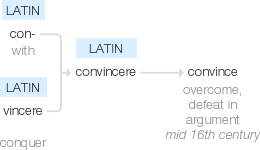Convince
mid 16th century (in the sense ‘overcome, defeat in argument’): from Latin convincere, from con- ‘with’ + vincere ‘conquer’. Compare with convict.
wiktionary
Borrowed from Latin convincō(“I refute, prove”), from con- + vincō(“I conquer, vanquish”). Doublet of convict. Displaced native Old English oferreċċan.
etymonline
convince (v.)
1520s, "to overcome in argument," from Latin convincere "to overcome decisively," from assimilated form of com-, here perhaps an intensive prefix (see com-), + vincere "to conquer" (from nasalized form of PIE root *weik- (3) "to fight, conquer"). Meaning "to firmly persuade or satisfy by argument or evidence" is from c. 1600. Related: Convinced; convincing; convincingly.
To convince a person is to satisfy his understanding as to the truth of a certain statement; to persuade him is, by derivation, to affect his will by motives; but it has long been used also for convince, as in Luke xx. 6, "they be persuaded that John was a prophet." There is a marked tendency now to confine persuade to its own distinctive meaning. [Century Dictionary, 1897]
